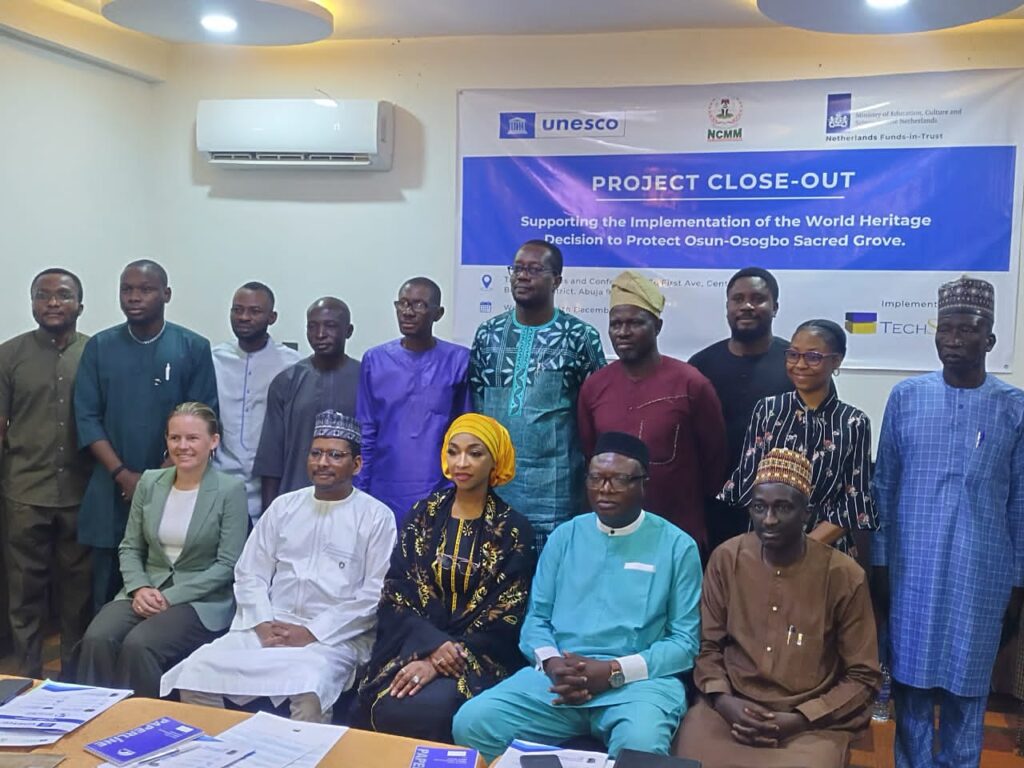
Hannatu Musawa, the Minister of Arts, Culture, Tourism and Creative Economy, and other stakeholders at the Netherlands Fund-In-Trust Supported Project to support the implementation of the World Heritage Decision to Protect Osun-Osogbo Sacred Grove organised on Wednesday in Abuja.
FG expresses worry over limited Nigerian cultural heritage on world sites
The Federal Government on Wednesday expressed concern over limited Nigerian cultural heritage on World Heritage Sites.
The News Agency of Nigeria (NAN) reports that presently, only Osun-Osogbo Sacred Grove in Osun and Sukur Cultural Landscape in Adamawa are on the United Nations Education, Scientific and Cultural Organisation (UNESCO)’s list.
While Sukur Cultural Landscape was listed on the world heritage sites in 1999, Osun-Osogbo Sacred Grove was listed in 2005.
Hannatu Musawa, the Minister of Arts, Culture, Tourism and Creative Economy, however, said the number was unsatisfactory.
She stated this in Abuja at the Netherlands Fund-In-Trust Supported Project to support the implementation of the World Heritage Decision to Protect Osun-Osogbo Sacred Grove.
“The fact that Nigeria only has only two sites; Sukur Landscape and Osun-Osogbo Sacred Grove on world list, is too minimum to me; it is not enough for a country like Nigeria that has many expressions of culture.
“Certainly, we have to work in tandem with UNESCO to ensure that within the next couple of years, we expanded exponentially to ensure that Nigeria has a number of sites recognised on the UNESCO list,” she said.
Musawa said supporting the implementation of the world heritage sites’ decision to protect Osun-Osogbo Scared Grove would help to preserve part of the nation’s culture and history, project Nigeria internationally, promote tourism and ensure job creation.
To safeguard Nigeria’s cultural and natural heritage, she said, the ministry developed and would implement key initiatives aimed at ensuring expansion across the key thematic areas of our cultural promotion and preservation.
Mr Abdourahamane Diallo, the Head of Office, UNESCO Abuja Regional Office, expressed the organisation’s continued support in achieving the objectives.
Diallo said among the objectives “are the further enlistment of new sites to the World Heritage List and the continued protection and conservation of those sites in Nigeria already put on the list.”
“This is also the place for me to congratulate myself on the quality of the collaboration between the Culture Team in Abuja Office and the Nigerian culture ecosystem, especially with CSOs such as TechSAH and the People and Culture Protection Initiative,” he said.
Dr Lateef Olagunju, Secretary-General, National Commission for UNESCO, Nigeria, said the event was significant because it was to address critical issues that had to be done with protecting the cultural heritage.
“They are the priceless assets we have which connect us to the past and the future,” he said.
Chinedu Gbulie, Project Lead, Technological Support for Aiding Humanity Initiative (TechSAH), thanked UNESCO for its support in investing in the cultural sector in Nigeria.
He said under the project, TechSAH visited the states to explore ways to protect and preserve the cultural heritage.
Gbulie said through the project, the capacity of the security agencies in the country had been improved on protecting these assets.
“We have opened their eyes to how to track and prevent moving cultural heritage outside Nigeria,” he said.
He said the presence of the minister demonstrated the commitment to revitalising the cultural sector.
The Ambassador-Designate, Kingdom of Netherlands, Bengt Loosdrecht, stressed his country’s commitment to continue to support Nigeria.
Loosdrecht, who was represented by Anneloes Hoff, the Second Secretary in the embassy, said the preservation of cultural heritage is a key value that Nigeria and Netherlands share.
“We hope that this contribution will make for the preservation of Nigeria cultural heritage for tourism and others,” he said.
